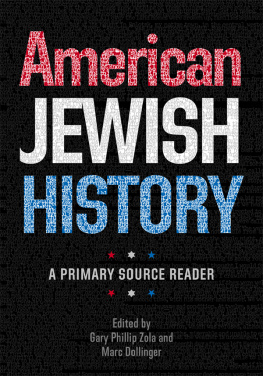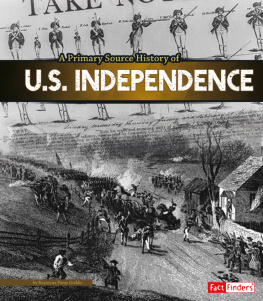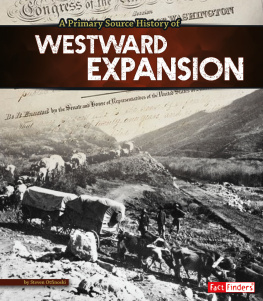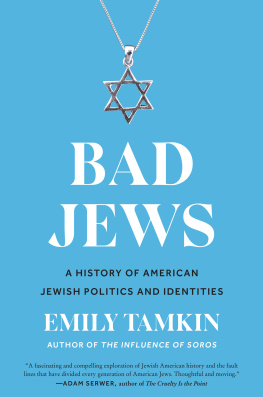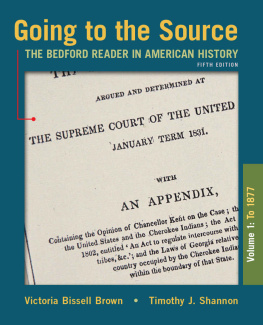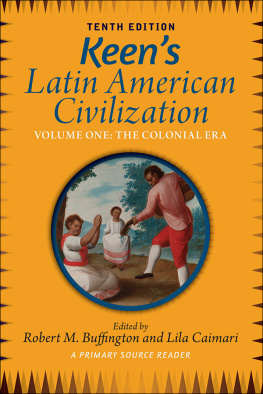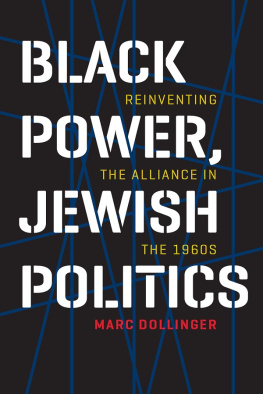Dollinger Marc - American Jewish History A Primary Source Reader
Here you can read online Dollinger Marc - American Jewish History A Primary Source Reader full text of the book (entire story) in english for free. Download pdf and epub, get meaning, cover and reviews about this ebook. City: USA, year: 2014, publisher: Brandeis University Press, genre: Home and family. Description of the work, (preface) as well as reviews are available. Best literature library LitArk.com created for fans of good reading and offers a wide selection of genres:
Romance novel
Science fiction
Adventure
Detective
Science
History
Home and family
Prose
Art
Politics
Computer
Non-fiction
Religion
Business
Children
Humor
Choose a favorite category and find really read worthwhile books. Enjoy immersion in the world of imagination, feel the emotions of the characters or learn something new for yourself, make an fascinating discovery.
- Book:American Jewish History A Primary Source Reader
- Author:
- Publisher:Brandeis University Press
- Genre:
- Year:2014
- City:USA
- Rating:3 / 5
- Favourites:Add to favourites
- Your mark:
- 60
- 1
- 2
- 3
- 4
- 5
American Jewish History A Primary Source Reader: summary, description and annotation
We offer to read an annotation, description, summary or preface (depends on what the author of the book "American Jewish History A Primary Source Reader" wrote himself). If you haven't found the necessary information about the book — write in the comments, we will try to find it.
American Jewish History A Primary Source Reader — read online for free the complete book (whole text) full work
Below is the text of the book, divided by pages. System saving the place of the last page read, allows you to conveniently read the book "American Jewish History A Primary Source Reader" online for free, without having to search again every time where you left off. Put a bookmark, and you can go to the page where you finished reading at any time.
Font size:
Interval:
Bookmark:
ABBREVIATIONS
AJ
Jacob R. Marcus. American Jewry: Documents, Eighteenth Century. Cincinnati: Hebrew Union College Press, 1959.
AJA
The Jacob Rader Marcus Center of the American Jewish Archives
AJAJ
American Jewish Archives Journal
AJHS
American Jewish Historical Society
AJW
Jacob R. Marcus. The American Jewish Woman: A Documentary History. New York and Cincinnati: Ktav and American Jewish Archives, 1981.
CAJS
Herbert D. Katz Center for Advanced Judaic Studies, University of Pennsylvania
DHJ
Morris U. Schappes, ed. A Documentary History of the Jews in the United States, 16541875. New York: Citadel Press, 1950; rev. 1952.
HUC-JIR
Hebrew Union CollegeJewish Institute of Religion
JAW
Jacob R. Marcus, ed. The Jew in the American World: A Sourcebook. Detroit: Wayne State University Press, 1996.
JUS
Joseph L. Blau and Salo W. Baron. The Jews of the United States, 17901840: A Documentary History. 3 vols. New York: Columbia University Press, 1963.
PAJHS
Publications of the American Jewish Historical Society
Creating Community
THE AMERICAN JEWISH EXPERIENCE DURING THE COLONIAL PERIOD, 16541776
For colonial-era Jews, immigration, acculturation, and civic status emerged as the central themes of the American experience. In some ways, colonial Jews, who numbered just hundreds in the seventeenth century and a few thousand by the time of the American Revolution, had certain characteristics in common. A significant number of colonial Jews worked in the commercial trades and lived in economic centers such as Newport, New York, Philadelphia, Savannah, and Charleston. Whether they were of Central European ancestry or traced their roots to the great Jewish community of the Spanish empire, colonial Jews worshiped according to the Spanish-Portuguese liturgical rite. These pioneering Jewish settlers also faced common challenges and experienced similar opportunities as they adapted to their new lives on the North American continent.
Yet their experiences as immigrants and then as colonial Jews also reflected a broad, and varied, acculturation process. Different local laws and customs in each of the thirteen colonies revealed the competing motives of British colonialism. The first Jewish community in North America sprang to life in September 1654 when twenty-three refugees from the Dutch colony of Recife, Brazil, arrived in the Dutch colony of New Amsterdam. The story of this first Jewish settlement reveals that these pioneering Jews were determined to secure their status. They sought to remain in the colony, and they asserted themselves in an effort to ensure their civil rights. This trend continued after New Amsterdam became New York. Later, Jews began to settle in other North American colonies such as Rhode Island, Pennsylvania, South Carolina, and Georgia, where the allure of the mercantilist system was particularly strong in these colonies port cities. Yet these Jews wanted more than economic opportunity; they also wanted civil equality and a social setting wherein they could fulfill their desire to worship openly as Jews. This is why they avoided those colonies that were founded as havens for particular Christian religious groups, such as the Puritans, which tended to limit the immigration and influence of religious outsiders. Across colonial America, Jews strove to achieve an elusive goal: civil equality in a Christian-dominated society. What that meant, and how it was achieved, differed among American Jews, as the documents that follow illustrate.
Colonial Jews also developed new approaches to religious life. With such small numbers, American Jews in this period lacked the critical mass to build large Jewish organizational structures or to establish the kind of associational networks that would arise during the nineteenth century; therefore, colonial Jewish life was synagogue-centered. Jewish colonists interacted freely with non-Jews, and the phenomenon of intermarriagean unusual occurrence for Jews who lived in the Old Worldbecame a familiar trend in colonial America. It has been estimated that perhaps as many as one in every four Jews married a partner from a non-Jewish family.
American Jews fashioned their religious lives according to Jewish tradition as well as to the larger religious and civic culture of their surrounding communities. Synagogues, for example, tended to emulate current architectural trends. As the movement for greater democratic control of American government institutions gained traction in the colonies, so too did the democratic spirit influence the governance documents of the American synagogue and, ultimately, other Jewish organizations.
These major themes from the colonial period would recur throughout the course of American Jewish history.
BEGINNINGS
1.01RABBI ISAAC ABOAB DE FONSECA, RECIFE, BRAZIL, N.D.
Rabbi Isaac Aboab de Fonseca (16051693) served as the spiritual leader of Recifes Jews from 1642 until 1654. Portuguese-born, Aboab was raised in France and Amsterdam. He became a rabbi while in Amsterdam and later served the communitys Congregation Bet Israel. His first years in Recife witnessed a flourishing Jewish community aided by Dutch colonial authorities who respected religious pluralism. Beginning in 1646, though, a series of Portuguese raids on Recife unsettled its Jewish community. When Portuguese forces recaptured their onetime colony in 1654, they evicted its Jewish residents, who fled to Amsterdam, the Caribbean, as well as the Dutch colony of New Amsterdam in North America. The second image is a painting of Recife by Zacharias Wagenaer (16141668). Wagenaer (also spelled Wagener, Wagenaar, or Wagner) was the son of a German illustrator who lived in the Dutch colony during the late 1630s.
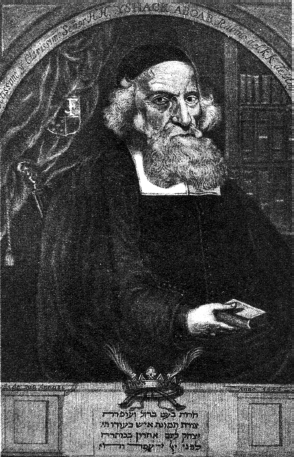
Source: PC-11, AJA.
1.02RECIFE, BRAZIL, BY ZACHARIAS WAGENAER, N.D.
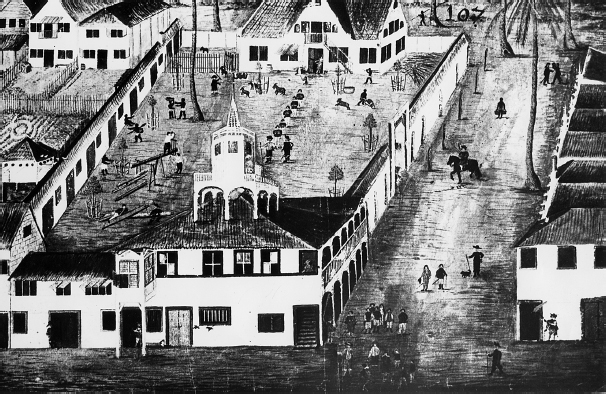
Source: PC-3616, AJA.
1.03PETER STUYVESANT, MANHATTAN, TO THE AMSTERDAM CHAMBER OF DIRECTORS, SEPTEMBER 22, 1654
In the letters that follow, Dutch colonial governor Peter Stuyvesant (16121672) communicates with the Dutch West India Company on the status of New Amsterdams recent Jewish arrivals. While Stuyvesant opposed a permanent Jewish community in his jurisdiction, owners of the West India Company, which included some Jews, rallied behind the Jewish immigrants. In April of 1665, the directors informed Stuyvesant of their decision. The Jewish refugees would be allowed to travel and trade and to live and remain in New Netherland provided the poor among them shall not become a burden to the company or to the community... [and] be supported by their own nation.
The Jews who have arrived would nearly all like to remain here, but learning that they (with their customary usury and deceitful trading with the Christians) were very repugnant to the inferior magistrates, as also to the people having the most affection for you; the Deaconry [which takes care of the poor] also fearing that owing to their present indigence [due to the fact that they had been captured and robbed by privateers or pirates] they might become a charge in the coming winter, we have, for the benefit of this weak and newly developing place and the land in general, deemed it useful to require them in a friendly way to depart; praying also most seriously in this connection, for ourselves as also for the general community of your worships, that the deceitful race,such hateful enemies and blasphemers of the name of Christ,be not allowed further to infect and trouble this new colony, to the detraction of your worships and the dissatisfaction of your worships most affectionate subjects.
Next pageFont size:
Interval:
Bookmark:
Similar books «American Jewish History A Primary Source Reader»
Look at similar books to American Jewish History A Primary Source Reader. We have selected literature similar in name and meaning in the hope of providing readers with more options to find new, interesting, not yet read works.
Discussion, reviews of the book American Jewish History A Primary Source Reader and just readers' own opinions. Leave your comments, write what you think about the work, its meaning or the main characters. Specify what exactly you liked and what you didn't like, and why you think so.

